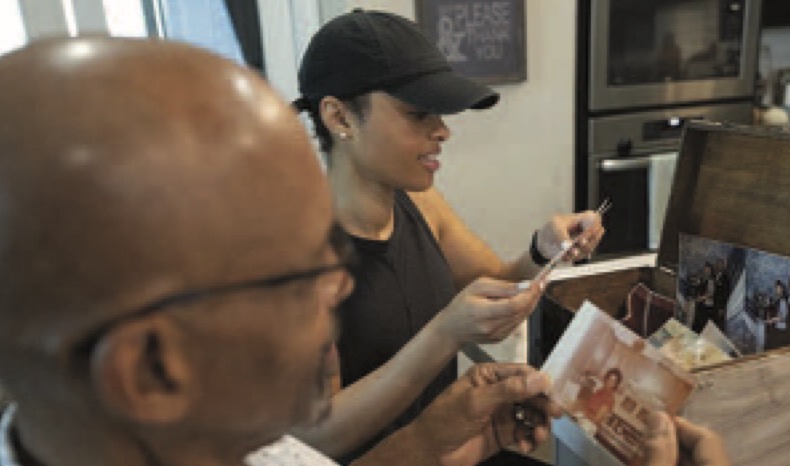FOR YOUR HEALTH: New Survey Reveals Knowledge Gaps About Breast Density and Cancer Risk

Ashley Dedmon looks at family photos with her father. With a family history of cancer on both her mother and her father’s side, Dedmon underwent genetic testing and learned she is a carrier of the BRCA2 mutation that predisposes her to breast cancer.
(NAPSI)—The latest Cancer Risk Survey: Breast Cancer Edition from Myriad Genetics shows that more than half (63 percent) of women do not know that breast density can reveal an increased risk of breast cancer.
Though dense breast tissue is normal, women who have it are at a slightly elevated risk for developing breast cancer. New FDA guidelines require that by September 2024, all breast imaging facilities must alert patients by letter if they have dense breasts, and provide recommendations that they contact their care provider for follow-up and risk assessment.
For women with dense breasts, additional screening methods such as ultrasound or MRI may be recommended in addition to mammograms to improve cancer detection rates.
Dense breasts present unique challenges in breast cancer screening, but awareness and proactive management can help mitigate these challenges,” said Dr. Ifeyinwa Stitt, an OB-GYN physician in Annapolis, MD. “By understanding their breast density and cancer risk, women can make informed decisions about their screening options and take proactive steps to prioritize their well-being.”
The survey also revealed that the majority (92 percent) of women understand detecting cancer early means they have more treatment options, which means a higher chance for better outcomes. However, only 66% of women believe annual breast checks are necessary.
While many women (40 percent) think they should receive additional screenings like MRIs or ultrasounds if they are if they are identified as having dense breasts, only 33 percent of those would consider genetic testing.
These findings expose a critical gap in understanding, as insights gathered through genetic testing may reveal patients at increased risk that would benefit from additional screenings to identify cancer at its earliest, most treatable stage. By combining genetic insights, family history and other clinical factors like breast density, MyRisk® Hereditary Cancer Test with RiskScore® calculates a woman’s 5-year and remaining lifetime risk of breast cancer. If a woman is found to be at high risk, she then has multiple options available to her, including a change in medical management.
“Breast cancer has impacted my family since before I was born—my great grandmother, grandmother and mother all passed away from breast cancer. My mother lost her battle at only 42, when I was only 21-years old,” said Ashley Dedmon, a patient advocate for Myriad’s MyRisk with RiskScore test. “I want every clinician in the country who may not think genetic testing is necessary to hear my story. Your patients want and need this screening.” Know your risk, plan for your future. Learn more by visiting getmyrisk.com.
Responsible journalism is hard work!
It is also expensive!
If you enjoy reading The Town Line and the good news we bring you each week, would you consider a donation to help us continue the work we’re doing?
The Town Line is a 501(c)(3) nonprofit private foundation, and all donations are tax deductible under the Internal Revenue Service code.
To help, please visit our online donation page or mail a check payable to The Town Line, PO Box 89, South China, ME 04358. Your contribution is appreciated!


Leave a Reply
Want to join the discussion?Feel free to contribute!